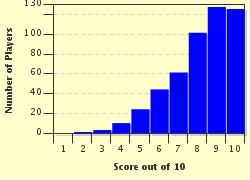Quiz Answer Key and Fun Facts
1. K - This is what you are when you know a lot about a subject, which means you'll no doubt get this answer correct.
2. L - This is what women wear under their clothes. Silk, lacy, ones are the best, although that's not what they're made of in this word.
3. M - This is what the Native Americans wore on their feet, and what I like to wear around the house. So comfy!
4. N - This is what you are when you get a stomach upset or "bug". Nothing you want to do or to be. It also has a good deal to do with the early months of pregnancy, so you men will miss that experience.
5. O - Now this is what you do when you can't make up your mind between two or more things, such as "Which pair of shoes looks the best"? Or, "Should I go out with him or not?" It's a word that can be used lots of times in one's life!
6. P - This is how you'd best keep your skis when turning...or else you might be sorry! If also has other meanings, such as "everywhere equidistant".
7. Q - This is what you have to complete many times for bureaucratic reasons, or when applying for a job. Also, you usually must fill one out for your accountant who handles your Federal Income Taxes.
8. R - This is a survey to gain information of some sort, often used in a military context. It's also what children think they're doing when they play cowboys and Indians, albeit they probably wouldn't think that word is what they're doing.
9. S - This could be something we plan while day-dreaming. It could also be something we think about as a possibility for future action. It can also be the plot outline of a play or television show as well as a libretto for the opera. Now, choose which is the correct spellings, please.
10. T - This is something that may come in very handy if you're planning a Yard Sale and the weather looks as if it might turn bad. In fact, depending on how much "junque" you have, you might need two!
Source: Author
habitsowner
This quiz was reviewed by FunTrivia editor
LadyCaitriona before going online.
Any errors found in FunTrivia content are routinely corrected through our feedback system.

